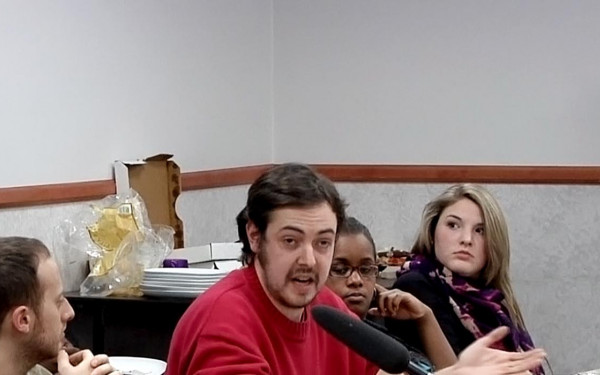Editorial
A Union in Need of Some Unity
The Concordia Student Union’s executives have lost their marbles.
Rudderless, the CSU is having a hard time staying afloat. Since outgoing president Schubert Laforest resigned unexpectedly on Feb. 7, progress on several major projects has been halted, as there is no authority present to sign relevant documents and contracts.
Two weeks ago, the CSU executive had an opportunity to solve the union’s leadership woes by working with council to fill the vacancy.
Instead, as if in a bad Western movie, they entered the council meeting on Feb. 13 guns blazing, threatening councillors if they didn’t install their sole choice for CSU president, current VP Clubs and Internal Affairs Nadine Atallah.
In an ideal world, the executive would have consulted council before proposing a successor for Laforest. Negotiations would have ensued, with the result of council and the executive reaching a happy compromise in the form of a CSU presidential nominee they could both support.
The councillors, quite reasonably, wanted more than one candidate to be presented to them; they wanted discussion and good-faith negotiation. That would have produced some semblance of a democratic process, not just an uncontested coronation.
But the execs were more comfortable threatening their own board with legal action, claiming that CSU Bylaw 7.4 required council to approve their choice for president.
The CSU council is all too often divided along ideological lines, but that wasn’t the case this time. Councillors unanimously opposed the idea of Atallah assuming the presidency, which should have sent a clear message to the execs.
That the executive ignored this and acted so belligerently toward council is not only bad form—it’s unacceptable and, arguably, undemocratic.
It’s true that students democratically elect the execs. However, they are elected to specific portfolios, and as such are not meant to be direct representatives of the student body. Rather, it is the councillors who are elected to be the student voices within Concordia’s undergraduate student government.
In a situation like this one, it’s assumed that councillors represent the stance of the 35,000 undergraduate students they’re accountable to. For the executive to entrench itself in its position and not negotiate with council to find an alternative presidential nominee can only be characterized as senseless.
The executive’s desire for a president who is already a member of their team is understandable. That they’d rather Atallah be president than some outsider appointed by council isn’t surprising.
What is surprising is that the executives are so adamant that Atallah become president that they are willing to bring down the whole student government rather than work out their disagreements with the councillors. If that does happen, though, it’ll be the students they were elected to represent who will be most negatively affected.
There are good reasons why Atallah may not be the ideal presidential candidate. For one, she has admitted that she is ineligible to sit on Concordia University’s Board of Governors or Senate.
How that doesn’t bother her or any of the other executives is anyone’s guess; the CSU president, as the face of Concordia’s undergraduate student body, should sit on these important decision-making bodies.
That Laforest didn’t sit on the BoG or Senate this past year is hardly a good excuse for future CSU presidents not to do so, though.
Left to its own devices, council had no choice but to seek out its own alternatives to Atallah, but other candidates favoured by council were reluctant to toss their names into the ring.
And that’s not a good sign for students. Given the stalemate between council and the executive, it seems the student government will continue to solemnly march toward this year’s CSU election without a leader.
It seems CSU’s council and executive need to be reminded that this is the first time ever that the CSU marched on without a president for weeks. That’s left many of the union’s plans up in the air, with no one having the authority to sign off on them.
Furthermore, it’s left the CSU without a clear leader at a key juncture in Quebec history, with a summit on Higher Education in full swing and deliberations on the future of the province’s universities ongoing.
The CSU needs to resolve its leadership problem soon. There isn’t a moment to spare.

(WEB)_900_450_90.jpg)



3__600_375_90_s_c1.jpg)

(WEB)_600_375_90_s_c1.jpg)